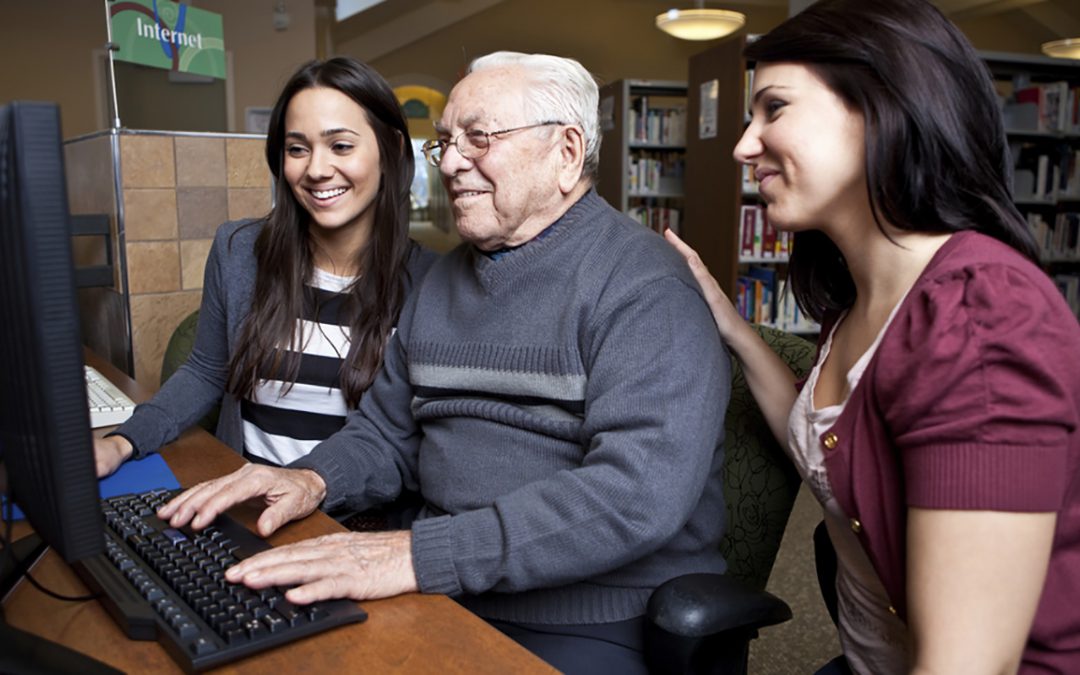Back when the Baby Boomer Generation was young, if they wanted to know about new technology, they asked their parents or other adults. But now that they have gray hair themselves, the acknowledged experts on all shiny new things are the young. Many older folks started learning computers back then and never stopped, becoming invaluable sources of wisdom over time. However, there are also a huge number of boomers who’ve missed out altogether on the computer revolution and the internet.
The Pew organization reports that 41% of seniors never go online at all – that’s almost half. Internet use and broadband adoption starts falling off around age 75 in any case, but this number is truly unfortunate. Younger seniors who are still unconnected could benefit greatly from getting online, probably more than other age groups. The internet is becoming ever-more important as a provider of government and other services, after all. Plus, net use opens up the world. It can greatly reduce the isolation and the depression and ill-effects that being cut off from the world causes, which aging often brings. Exposure to new ideas, learning and sharing new things helps keep the brain young, too. Physically, shopping online can be a lot easier than a visit to the mall. Plus staying connected to family can ease a lot of anxiety about health and well-being on both ends of the conversation.
But older adults may have physical difficulties in using a mouse or keyboard, and often touchpads are frustrating for people long-accustomed to those other input devices. So touchscreens may provide the best all-around alternative for seniors. Pew also found that there are other significant problems in seniors’ hooking up with the internet. Older folks tend to be more skeptical of benefits and hype, and far more concerned with privacy than Millennials. So only about 27% use social media, although those who do seem to check in more often than younger groups. Far fewer (only 18% as compared to 50% of the general population) have smartphones, which is about the same as the amount of tablets and e-readers elders use.
For those who do manage to get online, chances are there’s a younger person, usually a family member, gamely helping out, providing tech support. This is a burden on both, particularly as many oldsters not only find these unfamiliar devices and concepts downright intimidating, but asking for help from the kids somehow shameful. How to get the old folks online safely, able to get the things they want without driving everyone crazy can be a real problem.
The good news is that just like many hand tools have been redesigned for aging users, so have personal computers. There are now specialized devices designed to be easy for old people to use right out of the box. Plus, there are plenty of helpful websites and resources online, including a somewhat technical Computers for Seniors site run by the people who publish the “Dummies” books. Another website, The Seniors’ Guide to Computers offers free tutorials for older folks to learn to use PCs. And there are plenty of dedicated support sites for seniors and their caregivers – they often can provide insight and advice based on actual experience with these machines.
This article will provide a brief overview of what’s out there, and what people can do who can’t afford pricey custom set-ups.
Special systems for seniors
There are several brands ready to go with little configuration needed. Mainly tablets, these come with all the apps and links likely to be needed already loaded often including a few games, photo and music storage. There are also built-in cameras and microphones, some security, tech support, and usually an internet connection provided, They have large buttons and plain interfaces with nothing superfluous. Plus, they have the controls for utilities seniors might need, like screen magnification, readily accessible. They’re listed here from the most simple to those that are much like “regular” PCs.
For older folks with no technical abilities at all, one of the easiest to use and cheapest might be the grandPad. It even comes with a voice-to-email feature. It rents with no contract, either for $60/month or $636/year, billed annually. Though Internet connections are via Verizon and Wi-fi or 4G, email and calls are screened and accepted according to a contact list stored in the device, so unknown scammers can’t get to them.
Then there’s the Telekin, for which you may have seen the recent TV ads. It has a larger touchscreen, but may be used with keyboards and a mouse and there’s also a laptop model. The ads make the devices sound great, but according to one reviewer they are basically PCs with Windows replaced by a Linux operating system running a simple custom interface with large type, windows and custom apps. This makes them easy to use, but tech support especially by family members difficult. However, the system does come with professional tech support readily accessible, and a helpful remote access feature so the seniors don’t have to try it themselves.
But it sounds like there may be still some bugs. The reviewer reported frequent freezing, an occasional inability to attach photos to email, there’s no reply-all or forward function for the email client. and it is hard to remotely access from a Mac. These are all problems that the company said it knew about and was working on. The price is a bit steep, too: $699 covers the basic model with an 18.6″ screen, or $999 for one with a 20″ screen and larger drive. The user buys only the machine; internet service is not included in the package.
A little more expensive is the Wow! computer. The basic cost of this desktop with a 21″ screen is $1,299, although at present it’s dropped to $1,009. It sports much the same features as the Telekin, also runs on Linux, but they charge an extra $9.95/month for “VIP support”.
The MyGait computer costs $999 for a desktop with a 19.5″ non-touchscreen monitor, a large type keyboard, and trackball. It too, has a simple plain interface and apps. Runs on Windows 8, no internal disk drive or scanning capabilities. From the website, it is not at clear what security comes with it. The user must provide their own broadband connection, and the tech support package runs $19.95/month.
The widest range of computers for seniors is probably available from A Plus Senior Computers. They offer no tablets, but four laptops and four desktops, two each with touchscreens. Their computers start at $549 for a 15.6″ screen travel laptop to $1,699 for a desktop with a large 27″ screen. They boast of being twice as powerful as Telekin or Wow! and with many more features than MyGait. All their machines run the latest Windows 10 operating system but employ the Windows Classic Pro look from Windows 7 with a simple edge-to edge interface with large type and buttons. Lifetime virus protection (and a free membership to AOL for some reason) are also included, but the actual internet connection is not. Their “Signature Support” package uses remote access and talking through the problem to help with anything for $19.95/month.
Other desktops and laptops
For seniors who have some computer experience already, there’s a much broader array of devices available. These too are “all-in-one” models, which are easy to set up and use, but require more abilities or to know someone who does. There’s a list of desktops, which may be easier for seniors to use, starting at $500. For laptops, there’s another list with helpful questions to consider that may make it easier to decide, and helpful accessories. And to round things out, one for tablets. These require WiFi or 3G connections. Plus there are plenty of other resources out there, too. Big box stores now market whole lines of machines for the older set.
What Southwest Cyberport can do
SWCP is an Internet Service Provider, and a large number of our customers are seniors or getting there (not to mention a few folks who work here, too). It makes sense: we provide great, reliable internet connections, we have plenty of experience, and our tech support staff are your neighbors here in Albuquerque (many with elderly relatives of their own). Tech support is quick to answer the phone or email and patient, too.
We have found that online security is a primary concern of seniors. We encourage all our customers to contact us anytime with any concerns about fishy-seeming emails or weird machine behavior. We block scams as soon as reported or detected, work with any customers who have been infected, and we never sell any of their data to anyone.
While we can’t answer specific technical questions about any of the specialized devices listed above, our people know Windows, Linux, and Macs, as well as the internet. Plus, we too, can use a remote access system (with no charge to the customer) that makes setting-up and configuring much easier than having to follow technical instructions over the phone.
We offer a number of computer services. Along with high-speed broadband access and webhosting, we provide an inexpensive online backup service, Every customer gets limited online file storage along with a generous amount of email storage. A reasonable amount of tech support is included in each account without extra charge. One of our most popular features is that all customers can get one free virus scan and cleaning out of malware and clutter per year, and our staff can install software and hardware inexpensively and reliably.
In short, if you’re a senior or helping one get online, we’re your best local option for internet support. Call us at 232-7992 or email help@swcp.com.

